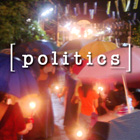
| MUSHARRAF, BHUTTO MEET IN SECRET EFFORT TO STABILIZE PAKISTAN GOVERNMENT Serious trouble started for Pakistan's president General Pervez Musharraf when a band of radical students, who seek to institute an Islamist state in place of Pakistan's strained democratic system, took over the Red Mosque in central Islamabad. Musharraf took power in a bloodless military coup in 1999, and has yet to restore the nation's democratic process. Musharraf has now met with Benazir Bhutto, exiled head of the main opposition party, in an effort to strengthen his government through a power-sharing deal with the nation's second largest political bloc. The Abu Dhabi meeting, reportedly held in secret, could be a genuine step by the military leader toward joining with the democratic opposition in an effort to ensure the survival of secular society in the densely populated, predominantly Muslim country. Musharraf's problems have escalated since he sided with the West in the war to oust the Taliban regime from power in Afghanistan in October 2001. Allies in the West view Musharraf's position as vital to regional and global security, as the growing insurgency in the northwest has ties to the Taliban and Al Qaeda, and Pakistan is a nuclear-armed nation of over 140 million inhabitants. Bhutto has maintained her party's demand that Pres. Musharraf resign his post as head of the military if he wants to remain as president. Musharraf has been reluctant to relinquish the post of military chief, fearing that doing so would diminish his ability to keep power and prevent the spread of radical Islamist ideology. Opponents say his heavy-handed tactics and military rule are fomenting the spread of opposition to a democratic civil society in Pakistan among those groups who feel they are marginalized by the ruling elite. One major issue, among allies as among enemies, is the timetable Musharraf has laid out for returning to regular democratic processes. Elections held since the 1999 coup have been criticized as rigged or inadequately transparent. The International Herald Tribune reports "The opposition charges that the 2002 elections of national and provincial representatives were fixed and insists that lawmakers chosen in parliamentary elections due at the end of 2007 should elect the next head of state. Some commentators say newly elected lawmakers may be less inclined to support Musharraf." For the power sharing agreement to include Bhutto as prime minister, Musharraf may have to force through changes to the constitution in order to allow for serving more than two terms as prime minister. Both sides say they have the interests of a democratic and secular Pakistan in mind, but both hold firm so far to their demands for what type of arrangement must come if there is power-sharing. Compromise will be needed, and is likely, as both sides have a lot to gain by strengthening civil society under a secular government. [s]
OUTER WALLS OF RED MOSQUE COMPLEX DEMOLISHED, MUSHARRAF GIVES ULTIMATUM TO MILITANTS INSIDE The standoff at the Red Mosque in the center of Islamabad, Pakistan, is nearing a potentially bloody crescendo. Pakistan's security forces have demolished nearly all the outer walls of the complex, and sporadic small-arms fire continues. At least 24 people have been killed since the hostage-taking and siege began 5 days ago. [Full Story] |
||||||
|
|||||||
